What causes waves - Study guides, Class notes & Summaries
Looking for the best study guides, study notes and summaries about What causes waves? On this page you'll find 5552 study documents about What causes waves.
Page 2 out of 5.552 results
Sort by
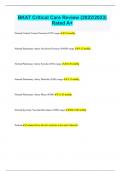
-
BKAT Critical Care Review (2022/2023) Rated A+
- Exam (elaborations) • 12 pages • 2023
- Available in package deal
-
- $9.99
- 2x sold
- + learn more
BKAT Critical Care Review (2022/2023) Rated A+ Normal Central Venous Pressure (CVP) range 2-8 mmHg Normal Pulmonary Artery Occlusion Pressure (PAOP) range 6-12 mmHg Normal Pulmonary Artery Systolic (PAS) range 20-30 mmHg Normal Pulmonary Artery Diastolic (PAD) range 5-15 mmHg Normal Pulmonary Artery Mean (PAM) 11-20 mmHg Normal Systemic Vascular Resistance (SVR) range 800-1200 mmHg Preload volume left in the left ventricle at the end of diastole What is preload affected by? venous return ...
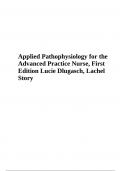
-
Test Bank - Applied Pathophysiology for the Advanced Practice Nurse 1ST Edition Lucie By Dlugasch, Lachel Story | Complete 2023/2024
- Exam (elaborations) • 146 pages • 2023
-
- $32.49
- 8x sold
- + learn more
Test Bank - Applied Pathophysiology for the Advanced Practice Nurse 1ST Edition Lucie By Dlugasch, Lachel Story | Complete 2023/2024. A 50-year-old man is having an acute myocardial infarction and will be administered recombinant tissue plasminogen activator (t-PA). The medication activates plasminogen in order to: A) decrease platelet adhesion. B) increase clotting time. C) promote fibrinolysis. D) promote coronary vasodilation. Ans: C Complexity: Easy Ahead: Hematopoietic System Subj...
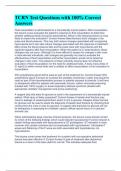
-
TCRN Test Questions with 100% Correct Answers
- Exam (elaborations) • 33 pages • 2024
- Available in package deal
-
- $13.99
- 2x sold
- + learn more
Fluid resuscitation is administered to a traumatically injured patient. After resuscitation, the trauma nurse evaluates the patient's response to that resuscitation to determine whether additional fluids should be administered. Which of the following factors is most likely to impact this evaluation? Correct Answer Beta-blockers blunt changes in the pulse and blood pressure. This may both reduce changes associated with recognizing hypovolemia but it can also reduce changes associated with the re...
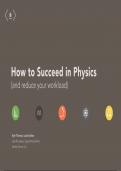
-
How to Succeed in Physics (and reduce your workload) Kyle Thomas, Luke Bruneaux, Veritas Tutors OpenStax
- Exam (elaborations) • 59 pages • 2023
-
- $10.49
- 1x sold
- + learn more
How to Succeed in Physics (and reduce your workload) Kyle Thomas, Luke Bruneaux, Veritas Tutors OpenStax Table of Contents HOW TO SUCCEED IN PHYSICS (and reduce your workload) Introduction............................................................................................. 7 MATH CONCEPTS.................................................................... 8 The ideas behind the symbols................................................................ 9 ALGEBRA................................
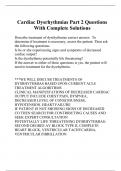
-
Cardiac Dysrhythmias Part 2 Questions With Complete Solutions
- Exam (elaborations) • 24 pages • 2023
-
Available in package deal
-
- $10.99
- 1x sold
- + learn more
Describe treatment of dysrhythmias correct answer: To determine if treatment is necessary, assess the patient. Then ask the following questions: Is he or she experiencing signs and symptoms of decreased cardiac output? Is the dysrhythmia potentially life threatening? If the answer to either of these questions is yes, the patient will need to treatment for the dysrhythmia. ***WE WILL DISCUSS TREATMENTS OF DYSRHYTHMIAS BASED UPON CURRENT ACLS TREATMENT ALGORITHMS CLINICAL MANIFESTATIONS ...
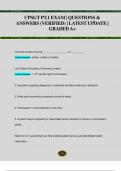
-
CPSGT PT.1 EXAM | QUESTIONS & ANSWERS (VERIFIED) | LATEST UPDATE | GRADED A+
- Exam (elaborations) • 24 pages • 2024
-
- $13.49
- 1x sold
- + learn more
1 CPSGT PT.1 EXAM | QUESTIONS & ANSWERS (VERIFIED) | LATEST UPDATE | GRADED A+ Informed consent may be _________, ________, or _________. Correct Answer: written, verbal or implied. List 5 Basic Principles of informed consent Correct Answer: 1. PT has the right to information 2. Questions regarding diagnosis or treatment should be referred to physician 3. Risks and discomforts to patients should be listed. 4. Participation in all procedures is voluntary. 5. Consent may be signed by...
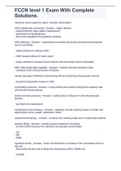
-
FCCN level 1 Exam With Complete Solutions.
- Exam (elaborations) • 13 pages • 2022
-
- $13.99
- 6x sold
- + learn more
minimum urine output for adult 0.5mL/kg/hr ADH (antidiuretic hormone) - water retainer - vasoconstrictor (also called Vasopressin) - produced by hypothalamus - store and released from posterior pituitary ADH pathway - hypothalamus senses low blood volumed and increased serum osmolality - signal pituitary to release ADH - ADH causes kidney to retain water - water retention increases blood volume and decreases serum osmolality ANP (atrial natriuretic peptide) -...
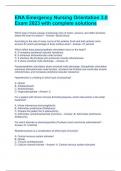
-
ENA Emergency Nursing Orientation 3.0 Exam 2023 with complete solutions
- Exam (elaborations) • 51 pages • 2023
-
Available in package deal
-
- $14.99
- 1x sold
- + learn more
Which type of shock causes a temporary loss of motor, sensory, and reflex functions below the level of a lesion? - Answer- Spinal shock According to the rule of nines, burns of the anterior trunk and both anterior arms account for which percentage of body surface area? - Answer- 27 percent Which effect does parasympathetic stimulation have on the heart? A. It increases peripheral vascular resistance. B. It enhances atrioventricular node function. C. It shortens His-Purkinje and ventric...
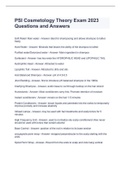
-
PSI Cosmetology Theory Exam 2023 Questions and Answers
- Exam (elaborations) • 6 pages • 2023
-
Available in package deal
-
- $9.99
- 4x sold
- + learn more
Soft Water/ Rain water - Answer- Best for shampooing and allows shampoo to lather freely Hard Water - Answer- Minerals that lessen the ability of the shampoo to lather Purified water/Deionized water - Answer- Main ingredient in shampoo Surfactant - Answer- has two ends the HYDROPHILIC HEAD and LIPOPHILIC TAIL Hydrophilic Head - Answer- Attracted to water Lipophilic Tail - Answer- Attracted to dirts and oils Acid Balanced Shampoo - Answer- pH of 4.5-5.5 Jheri Redding - Answer...
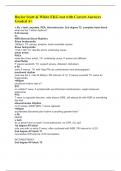
-
Baylor Scott & White EKG test with Correct Answers Graded A+
- Exam (elaborations) • 2 pages • 2023
-
- $9.19
- 1x sold
- + learn more
Baylor Scott & White EKG test with Correct Answers Graded A+ v fib, v tach, asystole, PEA, idioventricular, 2nd degree T2, complete heart block what are the 7 lethal rhythms? P-R interval #4 NSR (Normal Sinus Rhythm) Sinus bradycardia <60bpm, TX: pacing, atropine, treat reversible causes Sinus tachycardia >100-<160, TX: identify and tx underlying cause sinus arrest PACs looks like sinus arrest, TX: underlying cause, P waves are different atrial flutter P waves sawtooth, ...

How did he do that? By selling his study resources on Stuvia. Try it yourself! Discover all about earning on Stuvia


